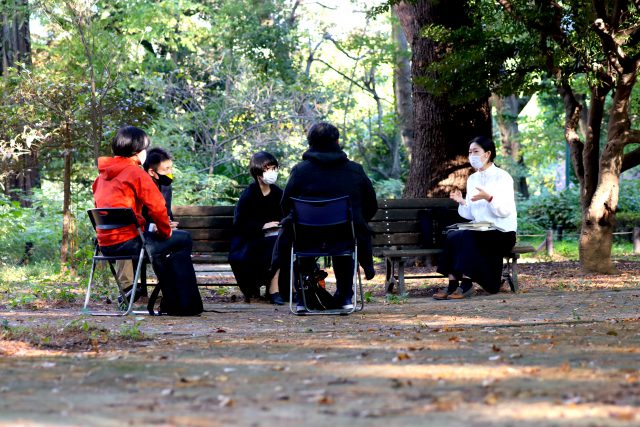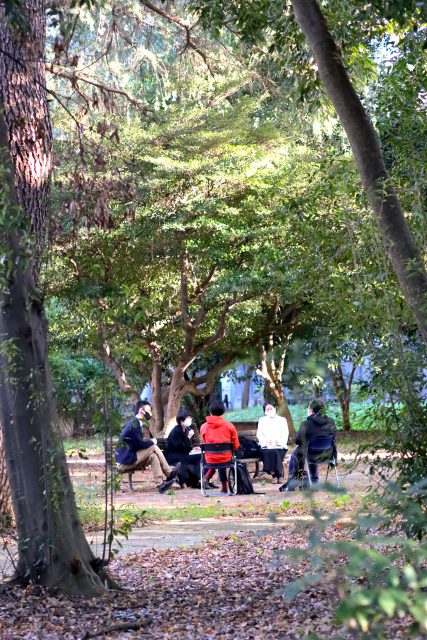At 13:30 on 10th November, 2020, the 2nd EAA Book Talk was held. Seitaro Maeno (EAA Project Assisant Professor), Yusuke Wakazawa (EAA Research Fellow), Zhang Yingzi (EAA Research Assistant), Ryohei Tatebe (EAA Research Assistant), and Hanako Takayama (EAA Research Fellow) participated in this session.

EAA Book Talk is a new attempt to have a casual discussion regarding books among EAA staff collaborating with the forthcoming multi-language Book Review Corner on the website. Last time, after Yusuke’s wonderful introduction, we were excited to talk about intellectual communities via books we brought. What was especially interesting was the examination of 18th century writing styles and approaches to rereading the canon. The Qing-dynasty scholars of ancient texts that Ryohei and Yingzi are working on evoked a lot of questions regarding how we read books and how intellectual people express their own thought today. That is why we shared several articles regarding Kaozheng in advance of this session: we tried to examine more deeply the concrete example of intellectuals in the 18th century. The following are the books or articles we brought this time.
Ryohei
・井上進『中国出版文化史』名古屋大学出版会、2002年。
・建部良平「人情と科学の哲学者:耐震及びデイヴィッド・ヒュームの比較可能性についての試(私)論」、『比較文学・文化論集』第37号、東京大学比較文学・文化研究会、2020年3月、23-43頁。
・建部良平「老いた人間は何処へ:段玉裁「四郊小学」説を読む」(近刊)
Yingzi
・大木康『明末のはぐれ知識人 馮夢龍と蘇州文化』講談社、1995年。
・酒井忠夫「明末清初の社会における大衆的読書人と善書・清言」、酒井忠夫編『道教の総合的研究』国書刊行会、1977年、370-393頁。
・鈴木正「明代山人考」、『清水博士追悼記念明代史論叢』大安社、1962年、357-388頁。
Yusuke
・Tim Milnes, The Testimony of Sense: Empiricism and the Essay from Hume to Hazlitt, Oxford University Press, 2019.
・長尾伸一『トマス・リード 実在論・幾何学・ユートピア』名古屋大学出版会、2004年。
Seitaro
・ウルリヒ・イム・ホーフ『啓蒙のヨーロッパ』成瀬治訳、1998年。
・小島毅『中国近世における礼の言説』東京大学出版会、1996年。
Hanako
・ガートルード・スタイン『みんなの自伝』落石八日月訳、マガジンハウス、1993年。
・Ann Jefferson, Biography and the Question of Literature in France, Oxford University Press, 2007.

First, based on Ryohei’s two papers, one comparing Dai Zhen and David Hume, and the other regarding self-criticism by Duan Yucai, we discussed the relation between the writing style and thought, not only in the texts written by intellectuals in the Qing dynasty but also in contemporary research papers including his own. Following this topic, Yusuke introduced Thomas Reed as a reference and we talked about how book culture was based on the collection of papers (文集) in China. After Hanako posed questions about biography and letters at that time, Yingzi responded using the example of private letters that become public ones like Ji Kang’s statement on ending a friendship. We also talked about the paradox of annotations: purportedly they contain no original thought and yet. This paradox is relevant to the hermeneutic approach. Intellectuals who were not scholars but were heavily inspired by the canon wrote freely and left texts. What kind of code were they sharing? Was it what we call ideology, convention, or custom?

This gathering reminded me of a small network among friends, which was the base of magazine making and review activities in 18th century Europe. The next step would be to think about the question of names –– authorship and signature behind the correlation between writing style and thought. Now we are in the first quarter of the 21st century and the question of –– including online publishing should –– be critically examined.

Hanako Takayama (EAA Project Assisant Professor)








